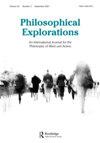Deciding: how special is it?
IF 1.1
3区 哲学
0 PHILOSOPHY
引用次数: 2
Abstract
ABSTRACT To decide to A, as I conceive of it, is to perform a momentary mental action of forming an intention to A. I argue that ordinary instances of practical deciding, so conceived, falsify the following two theses: (1) Necessarily, S intentionally A-s only if S intends to A; (2) In every actual case of intentionally A-ing, the agent intends to A. But I also argue that actions of some other types falsify these theses. Practical deciding is not unique in this respect. In another respect, however, it may be unique. It may be the only source of counterexamples to the thesis that, in any actual case of intentional action, some relevant intention is at work. In addition, actual instances of deciding to A may differ from other actual basic actions in that whereas the latter are successful attempts to A, actual agents never try to decide to A (as opposed to trying to decide what to do and to trying to bring it about that they decide to A).决定:它有多特别?
在我看来,决定A就是对A进行一种形成意图的瞬间心理行动。我认为,这样设想的实践决定的普通实例证伪了以下两个论点:(1)必然地,只有当S打算A时,S才有意A-S;(2) 在每一个故意作弊的实际案例中,代理人都有意作弊。但我也认为其他类型的行为会伪造这些论点。在这方面,实际的决定并非独一无二。然而,在另一方面,它可能是独一无二的。这可能是该论文反例的唯一来源,即在任何实际的故意行为中,一些相关的故意都在起作用。此外,决定选择A的实际情况可能与其他实际的基本行动不同,因为后者是对A的成功尝试,而实际代理人从未试图决定选择A(而不是试图决定做什么并试图实现他们决定选择A)。
本文章由计算机程序翻译,如有差异,请以英文原文为准。
求助全文
约1分钟内获得全文
求助全文

 求助内容:
求助内容: 应助结果提醒方式:
应助结果提醒方式:


